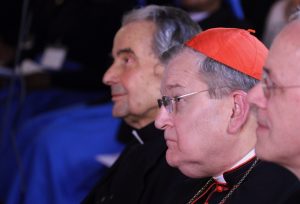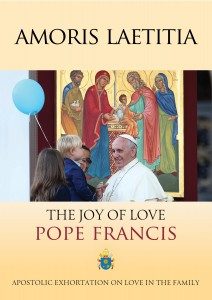Posted by Edward Pentin on Thursday Aug 17th, 2017 at 7:56 AM

-
Save
But he said it would be “quite simple” and involve presenting on the one hand the “clear teaching of the Church” and on the other “what is actually being taught by the Roman Pontiff.” The teaching in question in particular relates to doctrinal matters published in the Pope’s 2016 apostolic exhortation, Amoris laetitia.
The cardinal stressed that the dubia, five questions which he and three other cardinals (Cardinals Carlo Caffarra, Walter Brandmüller and Joachim Meisner) issued nearly a year ago, aimed to give the Holy Father the occasion to clarify these aspects of Church teaching.
They were issued in a “very respectful way and not in any way aggressive,” he said, but as the Pope has “chosen not to respond” to them, “so it is now necessary simply to state what the Church teaches about marriage, the family, acts that are intrinsically evil, and so forth.”

-
Save
The cardinal, a former prefect of the Apostolic Signatura, the Church’s highest court, did not give a timeframe for the correction, but hinted at its urgency by stressing that the Church is “being torn asunder right now by confusion and division” and that unity is at stake.
“The Holy Father must be called on to exercise his office to put an end to this,” he said.
Cardinal Burke first suggested a possible formal correction of the Pope in an interview with the Register last November, saying it is “clearly quite rare” but if there was no response, then it would be a “question of taking a formal act of correction of a serious error.” He spoke then of “tremendous division” that is “not the way of the Church.”
In his latest interview, he said he finds the situation “has only worsened” and pointed to groups of lay faithful, priests and bishops he has met who are “practically in desperation” over what is happening.
Any fraternal correction is expected to be undertaken in the first place in camera caritatis, in other words, not in public, according to Cardinal Brandmüller.
In his interview with The Wanderer, the cardinal warned of the danger of schism if universal doctrinal discipline is not restored, but reiterated his firm opposition to that ever happening. “A schism can never be correct,” he said, adding that what is happening is a situation of apostasy that the Blessed Mother warned about in her Message of Fatima.
“There can be apostasy within the Church and this, in fact, is what is going on,” he said. “In connection with the apostasy, Our Lady also referred to the failure of pastors to bring the Church to unity.”
In a speech last month, Cardinal Burke observed that disorientation and error had entered into the Church “in a diabolical way,” but encouraged the faithful to remain steadfast in the faith as well as courageous and serene, knowing Christ’s victory is “already written.”



This Post Has 6 Comments
Steve I'm confused. I thought that the Pope's pronouncements were infallible. If they are why is a Cardinal speaking out against them. If they are not why do Catholics say the Pope's pronouncements are infallible. I know you probably won't publish this comment but I'm curious about this aspect of Catholic teaching.
STEVE RAY: Popes are no infallible in everything they say or do. Only infallible under very carefully defined and strict limitations. Popes can and do say stupid things outside their realm of expertise and when they do they need to be corrected.
Mr Ray,
I am a big admirer of your work. My question is where does this leave us? I teach adult classes at the parish level, and it gets difficult to begin to try to justify what one hears from Rome whether its Pope Francis or not.
-JR
We need to pray, pray, pray and trust in the Lord.
Steve I don't think you can have it both ways. The Pope can't as head of the Catholic Church be infallible in some things and not in others. Who sets the carefully defined and strict limitations. Surely not the Cardinals as they are under the Pope and he is answerable only to God. Looks to me as if the Catholic laity don't want to accept the leading of Pope in this matter.
STEVE RAY HERE: Thomas, not a matter of having it both. There are clearly defined instances when a Pope speaks infallibly but not certainly everything he says or even teaches. Popes can and have said things and taugh things wrongly. You should study up in this issue. Catechism is a good place to start. God bless.
This is not really rocket science. Infallibility is a specific blessing given specific announcements. In everyday teachings, the Pope acts as a teacher, not necessarily infallible authority. We need to understand what he teaches, as we would any credible teacher, but unless invoked, infallibility is not extended to daily activities.
This isn't about infallibility, this is about papal primacy and authority. I am not sure what Cardinal Burke thinks he is doing, because as a Canon lawyer he should know that Canon 1404 says the pope is judged by no one, and Vatican I taught that papal authority is absolute, universal, and immediate.
I am worried that poor Cardinal Burke is going to embarass himself.
STEVE RAY HERE: Michael, thanks for your thoughts and comments. I take a bit of a different view and know that no pope is above criticism. We learn that from Scripture itself when Paul confronted Peter to his face in the book of Galatians. Sometimes popes need correcting. I think Cardinal Burke is the man to do it.
Comments are closed.